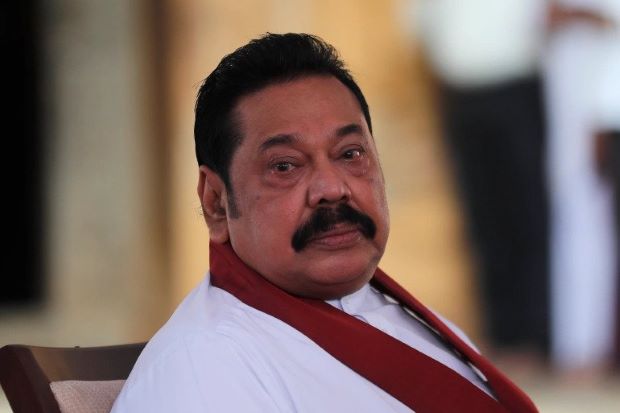Mahinda Rajapaksa vacates Colombo residence after privileges repealed
COLOMBO – Former President Mahinda Rajapaksa has begun vacating his official residence at Wijerama Mawatha in Colombo, following Parliament’s decision to repeal the law granting special entitlements to former heads of state, their widows, and retired MPs.
The President’s Entitlements (Repeal) Bill, passed on Wednesday (10) with a two-thirds majority of 150 votes in the 225-member House, strips former leaders of taxpayer-funded residences, staff, vehicles, and pensions that had been guaranteed under a 1986 Act. The vote came just a day after the Supreme Court ruled that the repeal did not contravene the Constitution, clearing the way for the new law to take immediate effect.
Rajapaksa’s spokesperson, Attorney Manoj Gamage, told reporters that the former leader had no intention of staying in the official residence “even for 24 hours” once the Bill was passed. He confirmed that Rajapaksa was preparing to leave for his hometown of Tangalle, though the formal handover of the property and state-owned belongings to the government would take about a week.
Several politicians and foreign diplomats were seen visiting Rajapaksa at the Colombo residence prior to his departure, underscoring both his enduring political influence and the symbolism of the move. The former president, who once commanded sweeping authority over Sri Lankan politics, has found his privileges steadily eroded under the austerity drive of the new administration.
President Anura Kumara Dissanayake’s government has argued that the repeal is both a cost-cutting measure and a step toward dismantling entrenched political privilege. Justice Minister Harshana Nanayakkara, presenting the Bill, said: “We are repealing the 1986 Act to save taxpayers’ money. Former leaders abused their powers to allocate themselves mansions and luxuries that ordinary citizens could never dream of.”
The legislation also affects other beneficiaries. Hema Premadasa, widow of assassinated president Ranasinghe Premadasa, will lose the pension she had been receiving since 1993. Former presidents Chandrika Kumaratunga and Maithripala Sirisena, who both reside in state-owned residences in Colombo’s diplomatic enclave, are also expected to be impacted.
The move has not gone uncontested. Opposition MP Dayasiri Jayasekara accused the government of acting out of political malice, specifically targeting Rajapaksa. “You are bringing this bill because you failed to evict President Rajapaksa through intimidation. You are now acting with hatred,” he charged during the debate.
Rajapaksa himself has not commented publicly, though aides confirmed he was complying with the new law. His party had earlier joined others in challenging the Bill before the Supreme Court, but the court dismissed the petitions.
The government has framed the repeal as part of broader reforms to restore financial discipline. Sri Lanka, still reeling from its worst economic crisis since independence, has been under pressure to cut public expenditure and dismantle systems of privilege that have long shielded political elites.
The former president’s security and benefits had already been reduced in stages. When President Dissanayake took office a year ago, Rajapaksa retained a security detail of 243 personnel, including 63 elite army commandos and 23 drivers, along with a fleet of luxury vehicles. The government has since cut his protection to 60 personnel and restricted his vehicles to three, including a Mercedes-Maybach and a high-end SUV.
The Wijerama Mawatha residence itself has long been a subject of controversy. In 2021, during his time as prime minister, Rajapaksa reportedly spent nearly 800 million rupees (US$ 2.7 million) of public funds refurbishing the colonial-era property. That expenditure, justified by his administration as necessary renovations, fuelled public criticism amid rising debt and austerity.
The Rajapaksas, once the most dominant political family in Sri Lanka, have faced a steady erosion of influence since mass protests in 2022 forced Gotabaya Rajapaksa, Mahinda’s younger brother, to resign from the presidency over allegations of corruption and mismanagement that triggered the island’s financial collapse. Gotabaya Rajapaksa vacated a state bungalow shortly after his resignation, in contrast to Mahinda’s prolonged occupation of the Colombo mansion.
Mahinda Rajapaksa himself, who served as president from 2005 to 2015 and later as prime minister, remains a polarizing figure. To supporters, he is still credited with ending the decades-long civil war against the Liberation Tigers of Tamil Eelam (LTTE) in 2009. To critics, he symbolizes entrenched corruption, nepotism, and the unchecked concentration of power.
Beyond the immediate savings, the repeal of the 1986 law carries symbolic weight. For many citizens, particularly younger generations bearing the brunt of Sri Lanka’s fragile recovery, the spectacle of former leaders enjoying lavish privileges has been a bitter reminder of systemic inequality.
For Rajapaksa, the exit from Colombo’s leafy diplomatic enclave may be his most humbling retreat since losing the presidency in 2015. For the country, it is a test of whether dismantling the trappings of power can translate into a more accountable, transparent, and equitable political culture.
-ENCL



Comments are closed, but trackbacks and pingbacks are open.